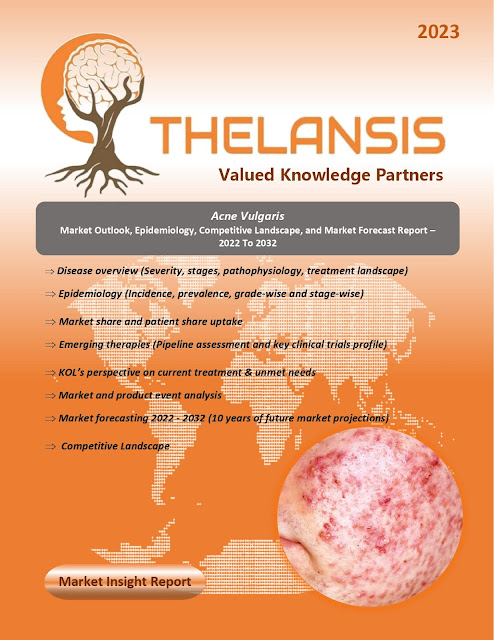Systemic Juvenile Idiopathic Arthritis (SJIA) – Market Outlook, Epidemiology, Competitive Landscape, and Market Forecast Report – 2024 To 2034
Systemic Juvenile Idiopathic Arthritis (SJIA) Market Outlook
Thelansis’s “Systemic Juvenile
Idiopathic Arthritis (SJIA) Market Outlook, Epidemiology, Competitive
Landscape, and Market Forecast Report – 2024 To 2034" covers disease
overview, epidemiology, drug utilization, prescription share analysis,
competitive landscape, clinical practice, regulatory landscape, patient share,
market uptake, market forecast, and key market insights under the potential Systemic
Juvenile Idiopathic Arthritis (SJIA) treatment modalities options for eight
major markets (USA, Germany, France, Italy, Spain, UK, Japan, and China).
Systemic Juvenile Idiopathic Arthritis
(SJIA) Overview
Systemic
juvenile idiopathic arthritis (SJIA), previously known as Still’s disease or
systemic juvenile rheumatoid arthritis, is a type of juvenile idiopathic
arthritis that initially affects the entire body or “system” before involving
the joints. The primary and most frequent symptom is the occurrence of high
fevers, often happening once or twice a day, with temperatures reaching 103°F
or higher. Arthritis represents the second most common early indication of
sJIA, and it may extend to various joints, including the spine (particularly in
the neck area), jaw, and hip joints. Compared to other forms of juvenile
idiopathic arthritis, sJIA is more severe and poses a more significant
challenge for diagnosis and treatment. For many patients, it becomes a lifelong
condition that persists into adulthood. The precise cause of sJIA remains
unclear, as children with sJIA typically lack autoantibodies in their
bloodstream, a common feature in other types of juvenile idiopathic arthritis.
One of the most serious potential complications associated with sJIA is a
condition known as macrophage activation syndrome (MAS).
Geography coverage:
G8 (United States, EU5 [France,
Germany, Italy, Spain, U.K.], Japan, and China)
Insights driven by robust
research, including:
- In-depth interviews with leading KOLs and payers
- Physician surveys
- RWE analysis for claims and EHR datasets
- Secondary research (e.g., peer-reviewed journal
articles, third-party research databases)
Deliverables format and
updates*:
- Detailed Report (PDF)
- Market Forecast Model (MS Excel-based automated
dashboard)
- Epidemiology (MS Excel; interactive tool)
- Executive Insights (PowerPoint presentation)
- Others: regular updates, customizations, consultant
support
*As per Thelansis’s policy, we
ensure that we include all the recent updates before releasing the report
content and market model.
Salient features of Market
Forecast model:
- 10-year market forecast (2024–2034)
- Bottom-up patient-based market forecasts validated
through the top-down sales methodology
- Covers clinically and commercially-relevant patient
populations/ line of therapies
- Annualized drug-level sales and patient share
projections
- Utilizes our proprietary Epilansis and Analog tool
(e.g., drug uptake and erosion) datasets and conjoint analysis approach
- Detailed methodology/sources & assumptions
- Graphical and tabular outputs
- Users can customize the model based on requirements
Key business questions answered:
- How can drug development and lifecycle management
strategies be optimized across G8 markets (US, EU5, Japan, and China)?
- How large is the patient population in terms of
incidence, prevalence, segments, and those receiving drug treatments?
- What is the 10-year market outlook for sales and
patient share?
- Which events will have the greatest impact on the
market’s trajectory?
- What insights do interviewed experts provide on
current and emerging treatments?
- Which pipeline products show the most promise, and
what is their potential for launch and future positioning?
- What are the key unmet needs and KOL expectations for
target profiles?
- What key regulatory and payer requirements must be
met to secure drug approval and favorable market access?
- and more…



Comments
Post a Comment